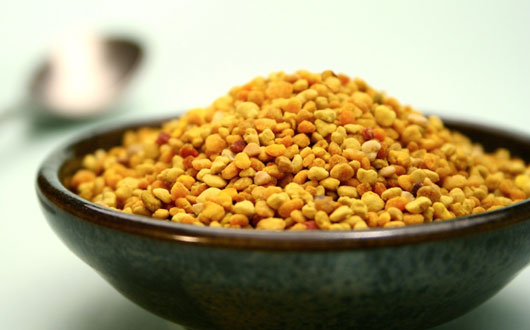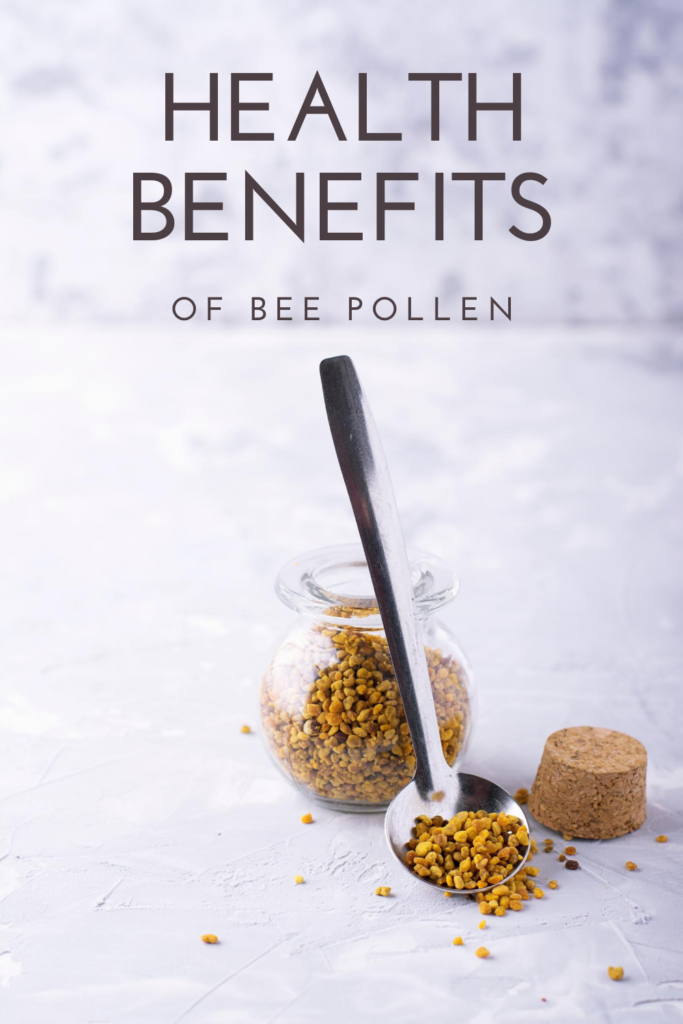
By now you’ve heard all about the amazing health benefits of raw honey, but honeybees have given us yet another superfood to enjoy – bee pollen.
Alongside raw honey, honeycomb, bee venom, and royal jelly, bee pollen is yet just another nutritious food made by the hard working honeybee.
In fact, Greeks and Romans called bee pollen “the life-giving dust”, and the pollen was often entombed with ancient pharaohs.
Bee pollen has been used as a holistic remedy throughout the world for years. Considered to be one of nature’s most complete and nourishing foods, bee pollen contains nearly all the nutrients required by humans.
In fact, bee pollen contains every nutrient required to sustain and support life in a pure, unprocessed form. Bee pollen is rich in protein (approximately 40%), free amino acids, minerals, vitamins including B complex, and folic acid. Pollen is the only plant source that contains vitamin B12.
What Is Bee Pollen?
Bee pollen is the fine powdery substance that is collected by honeybees from the stamens of flowers. The bees then store the pollen in the honeycomb of their hives as food for their colony.
Amazingly, it takes one bee working eight hours a day for one entire month to gather one teaspoon of pollen. This is why when bee pollen is harvested by farmers, they only take a small amount from a hive at a time so as to not rob the hive of its natural food source.
One of the most interesting facts about bee pollen is that it cannot be synthetically made. When researchers have tried to take away the pollen-filled comb from a bee and replace it with a synthetic pollen that has been manmade, the bee does not survive.
Even though the manmade food contains all of the nutrients that are known, there is still some missing ingredient that makes synthetic bee pollen an unviable source of food. Bees must add something “extra” that scientists are unable to identify, which means that bee pollen cannot be replaced by any manmade food.
Health Benefits of Bee Pollen

Not much research has been conducted on bee pollen, but there is no doubt that it is nutrient packed. While there may not be much evidence yet to support some claims of bee pollen, consider this:
The queen bee of a bee hive is responsible for laying 2,000 eggs daily, lives forty times longer than worker bees and survives off bee pollen alone. That makes bee pollen some pretty powerful stuff!
1. Enhances Energy
The variety of nutrients found in bee pollen make it a great natural energizer. With carbohydrates, protein and B vitamins, bee pollen can help to enhance stamina and fight off fatigue.
2. Soothes Skin Problems
The amino acids and vitamins in bee pollen help to protect the skin and boost the regeneration of skin cells. Products that aim to treat inflammatory issues such as eczema or psoriasis often include bee pollen in the ingredients.
3. Treats Allergies
Bee pollen can reduce the presence of histamines, making it a natural solution to a wide range of respiratory diseases. In a study preformed by Dr. Leo Conway, 94 percent of his patients saw relief from asthma, allergies and sinus problems.
4. Cardiovascular Health
Bee pollen contains a large amount of the antioxidant Rutin, a bioflavonoid that helps strengthen capillaries, blood vessels and helps regulate cholesterol levels. Rutin also has anti-clotting capabilities, meaning it could help prevent heart attack and stroke.
5. Boost Immune Health
Along with its vitamins and minerals, bee pollen also contains enzymes. Enzymes help the body to absorb all the nutrients needed from the food that we eat. Bee pollen also supports the intestinal flora, which in turn supports the immune system. The antioxidants found in bee pollen help protect the cells from free radical damage, keeping the body free from degenerative diseases.
How To Use Bee Pollen
Bee pollen can be found most commonly in granule or tablet form. The taste of the pollen depends on the flower and nectar source, but it typically has a slightly sweet, nutty flavor.
Eating bee pollen in its raw granule form is best. Heating bee pollen destroys its live enzymes and lowers its nutritional value, so do not add bee pollen to any food that requires heating.
If eating the granules directly is unappealing to you, try blending the pollen into a smoothie or sprinkling it into yogurt.
The Dangers of Bee Pollen
Bee pollen does not come without dangers. If you are in any way allergic to bees or have a pollen allergy, check with your doctor before ingesting any bee pollen.
If you are unaware of any allergies, you can test your reaction to the pollen on a small, safe scale by placing one or two grains of bee pollen on your tongue. If nothing happens after a few minutes, chew them up.
Your body will let you know if you have the slightest allergy to pollen by producing watery eyes, swelling in the mouth, lips or tongue and sneezing. If you have any symptoms, you should contact your doctor.
After you have determined whether or not you are allergic to pollen, you can consume one to three tablespoons of bee pollen a day.
Enjoyed 5 Health Benefits of Bee Pollen? Share it with your friends so they too can follow the Superfoodsliving journey.
Share on Pinterest
